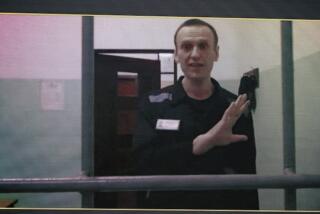Ex-Bulgarian Ruler Sentenced for Corruption : Justice: Todor Zhivkov is first former Soviet Bloc leader convicted in a regular court. Judge gives him seven years in prison.
- Share via
SOFIA, Bulgaria — The first post-Communist court to judge a former Soviet Bloc leader found Todor Zhivkov guilty Friday of corruption during his 35-year rule in Bulgaria and sentenced him to seven years in prison.
Zhivkov, 81, was convicted of embezzling nearly $1 million and letting Communist cronies buy cars, apartments and villas at near-giveaway prices.
A former aide, Milko Balev, was found guilty of illegal hard-currency transactions and sentenced to a two-year prison term. The two were acquitted of falsifying documents.
The verdict was read by Chief Judge Stefanka Stoyanova as Zhivkov and Balev stood facing the panel of three professional and four lay judges. Balev, 72, clutched a dais for support.
Three of the judges had dissenting opinions, but it was not known if they disagreed with the verdicts or sentences.
The dissents are to be published within a month.
Zhivkov was the first former Communist leader to be tried in a regular court since the Communists were swept from power in Eastern Europe.
Lawyers for Zhivkov, who maintained he was being railroaded in a political trial, said they would appeal the conviction. The prosecution, which had sought a 10-year sentence, planned to appeal the sentence.
Zhivkov had said he expected to end his days behind bars and was defiant during the 18-month-long trial.
Zhivkov’s critics charge that under his leadership Bulgaria plunged into an economic crisis that left it one of Europe’s poorest countries.
Nearly three years after the end of dictatorial Communist rule, Bulgaria remains crippled in its attempts to build a market economy from the ruins of central planning.
His defense argued that all decisions during Zhivkov’s rule were made collectively, so he should not be held solely responsible.
He still faces charges of inciting ethnic hatred through the forced assimilation of Bulgaria’s ethnic Turk minority; creating several harshly run concentration camps, and embezzling and misappropriating state property. No trial dates have been set.
Zhivkov resigned under pressure from reform-oriented Communist colleagues in late 1989, opening the way to democratic elections in June, 1990.
The Communist Party, which renamed itself the Socialists, lost elections to the anti-Communist Union of Democratic Forces, which now governs Bulgaria.
During Zhivkov’s tenure from 1954 to 1989--the longest of any Soviet Bloc leader--Bulgaria’s course meshed tightly with Moscow’s until Soviet dogmatism began to ease under former President Mikhail S. Gorbachev.
More to Read
Sign up for Essential California
The most important California stories and recommendations in your inbox every morning.
You may occasionally receive promotional content from the Los Angeles Times.













